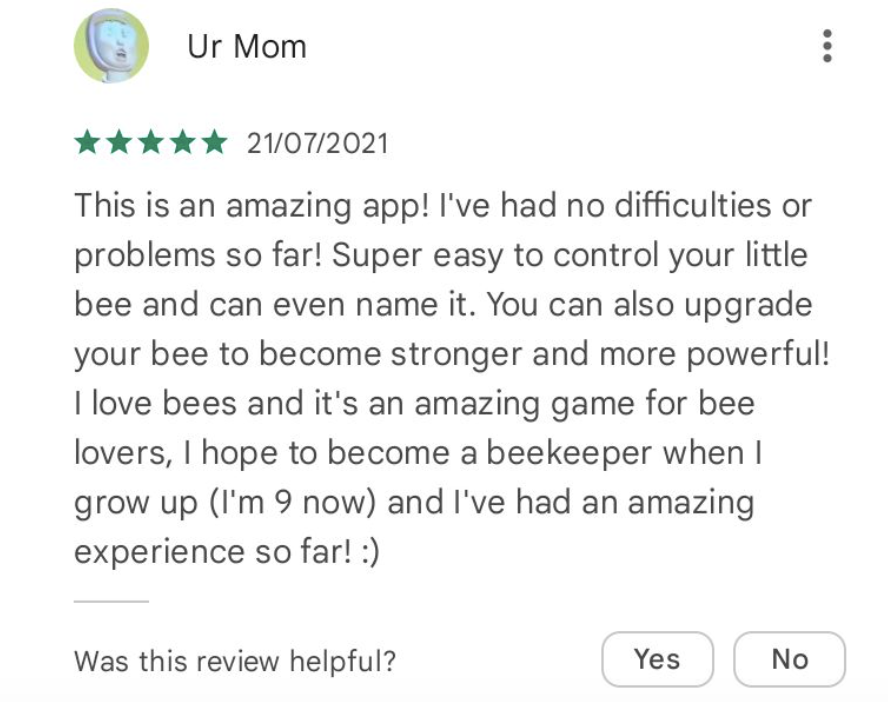
Welcome to Pixalate’s CTV & Mobile App Manual Reviews According to COPPA, a series containing the detailed factors the Trust & Safety Advisory Board educators used to assess an app’s child-directedness.
The educators manually review thousands of mobile apps available in the Google Play & Apple App Stores as well as connected TV (CTV) apps from the Roku Channel Store and Amazon Fire TV App Store using the COPPA Rule factors shown below & make those results available to the public at ratings.pixalate.com.
This post takes a look at a game from the Google Play Store. Our reviewer discusses how the subjective factors set forth in the COPPA Rule apply to the app and factor into the reviewer's determination as to whether the app is child-directed or general audience (i.e., it is not targeting children).

The teacher will indicate the factors they relied upon in their assessment using the 10 factors shown below that reflect the 10 child-directed factors in the COPPA Rule.

![]()
Reviews of the app suggest that it is enjoyed by older children. Some reviews are written by children who are using the game. Another review, written by an adult, recommends that the app is more suitable for older children, around 10 years plus. The controls are clunky and cumbersome, and are unlikely to be intuitive enough to allow a young child to play. However, older children would be able to manage more easily. It seems unlikely that adults would persevere with the frustrating interface, which is reflected by some poor reviews from adults.
![]()
This game allows the player to get a feel for life as a honey bee. The gameplay isn’t entirely accurate and you have to find food for your bee on the ground, rather than visiting flowers for pollen. Other tasks include finding other bees and establishing a hive. The continuous missions encourage the player to keep going and keep engaging with the game.
![]()
At the very start of play, adverts were shown for other games by the same developers, including simulations as lions, spiders, ants etc. No other adverts were observed during play. This is of note given that the Privacy Policy states that the developers do not collect information, but their advertisers do.
![]()
Players accumulate Adventure Points, which they can use to acquire upgrades to their bee, such as attack ability and strength. This continuous upgrade system provides a compelling motivation to improve.
Privacy
A link to the Privacy Policy is available through the app menu. The policy states that they currently do not connect or store any personal information, but 3rd party advertisers may collect and analyze technical information including type of mobile device, platform, operating system, location etc. Additionally, they state that the game is not intended for children under 13 and that children should not be using it. However, this is contradicted by the user reviews on the Play Store.
An account is not needed to play, and there is no age gate or other age verification.
Screenshots of Honey Bee Simulator


Pixalate’s Trust and Safety Advisory Board was created to bring in individuals with experience using child-directed apps in the classroom to review and assess which apps are child-directed. This manual review process serves to quality check Pixalate’s automated review process. See our full methodology for more information.
Disclaimer
This blog post published by Pixalate is available for informational purposes only and is not considered legal advice. By viewing this blog post, the reader understands and agrees that there is no attorney-client relationship between the reader and the blog publisher. The blog should not be used as a substitute for legal advice from a licensed professional attorney in the applicable jurisdiction(s), and readers are urged to consult their own legal counsel on any specific legal questions concerning any specific situation. The content of this blog post reflects Pixalate's opinions with respect to factors that Pixalate believes may be useful to the digital media industry. Pixalate's opinions are just that, opinions, which means that they are neither facts nor guarantees; and this blog post is not intended to impugn the standing or reputation of any entity, person or app, but instead, to report findings pertaining to mobile and Connected TV (CTV) apps.
*By entering your email address and clicking Subscribe, you are agreeing to our Terms of Use and Privacy Policy.
These Stories on Mobile
*By entering your email address and clicking Subscribe, you are agreeing to our Terms of Use and Privacy Policy.

Disclaimer: The content of this page reflects Pixalate’s opinions with respect to the factors that Pixalate believes can be useful to the digital media industry. Any proprietary data shared is grounded in Pixalate’s proprietary technology and analytics, which Pixalate is continuously evaluating and updating. Any references to outside sources should not be construed as endorsements. Pixalate’s opinions are just that - opinion, not facts or guarantees.
Per the MRC, “'Fraud' is not intended to represent fraud as defined in various laws, statutes and ordinances or as conventionally used in U.S. Court or other legal proceedings, but rather a custom definition strictly for advertising measurement purposes. Also per the MRC, “‘Invalid Traffic’ is defined generally as traffic that does not meet certain ad serving quality or completeness criteria, or otherwise does not represent legitimate ad traffic that should be included in measurement counts. Among the reasons why ad traffic may be deemed invalid is it is a result of non-human traffic (spiders, bots, etc.), or activity designed to produce fraudulent traffic.”

